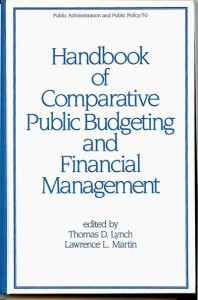Handbook of Comparative Public Budgeting and Financial Management
 Edited by Thomas D. Lynch and Lawrence L. Martin.
Edited by Thomas D. Lynch and Lawrence L. Martin.Includes bibliographical references and index.
ISBN 0-8247-8773-0
1. Finance, Public L. 2. Budget. I. Lynch, Thomas Dexter.
II. Martin, Lawrence L. III. Series.
HJ236.H26 1993
Copyright © 1993 by MARCEL DEKKER, INC. ALL RIGHTS RESERVED.
Neither this book nor any part may be reproduced or transmitted in any form or by any means, electronic or mechanical, including photocopying, microfilming, and recording, or by any information storage and retrieval system, without permission in writing from the publisher.
MARCEL DEKKER, INC.
270 Madison Avenue, New York 10016.
This book breaks new ground by stressing both comparative and empirical approach to public budgeting and financial management. Although this approach has been used before, especially in recent journal articles, this book significantly furthers that trend. In the history of mankind, the theory that the earth was the center of the universe was supreme for many centuries because it was consistent with religious beliefs and was also quite simple and elegant. With the invention of better telescopes and through careful observation, the scientific community slowly but eventually accepted other theories of the universe. Facts are the basis we must use to judge and revise our “knowledge,” which we call theory.
In public budgeting and financial management, we have descriptive and prescriptive theories that serve to us, but a better use of the comparative and empirical approach will be our telescope to improve our theories. By looking at such topics as cash management, budgeting behavior, and capital budgeting, we can use the comparative and empirical approach to better understand each phenomenon and, consequently, to improve out theories. With better theories, we can better shape our public policies and mange more intelligently.
This book is organized into an overview section and three parts. The first part focuses on international comparative subjects, the second part covers comparative national public budgeting, and the third part covers national comparative public financial managements topics.
We believe this book serves several purposes. It should help practitioners and academics keep up with developments in this field. It should also serve academics as a textbook or a supplemental reader in public budgeting and financial management courses. It can also be used in a comparative public budgeting course.
An edited book requires the cooperation and goodwill of many people. We thank all the contributors for their time and patience. We thank Rita Kraemer and Ilene Graham for their smiles and professionalism; coordinating various manuscript and reducing them to one style is a challenge that was met with good grace and necessary persistence. We thank Jack Jabin, Marcel Dekker’s Public Administration and Public Policy series editor, for his faith in this project and his wonderful positive spirit.
Thomas D. Lynch
Lawrence L. Martin
